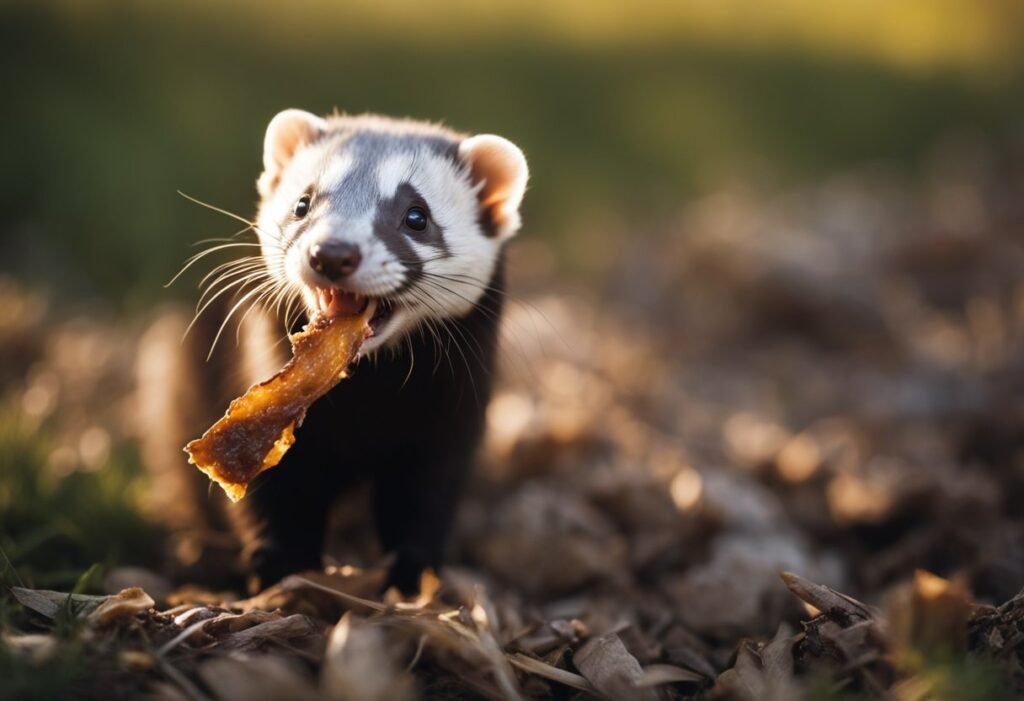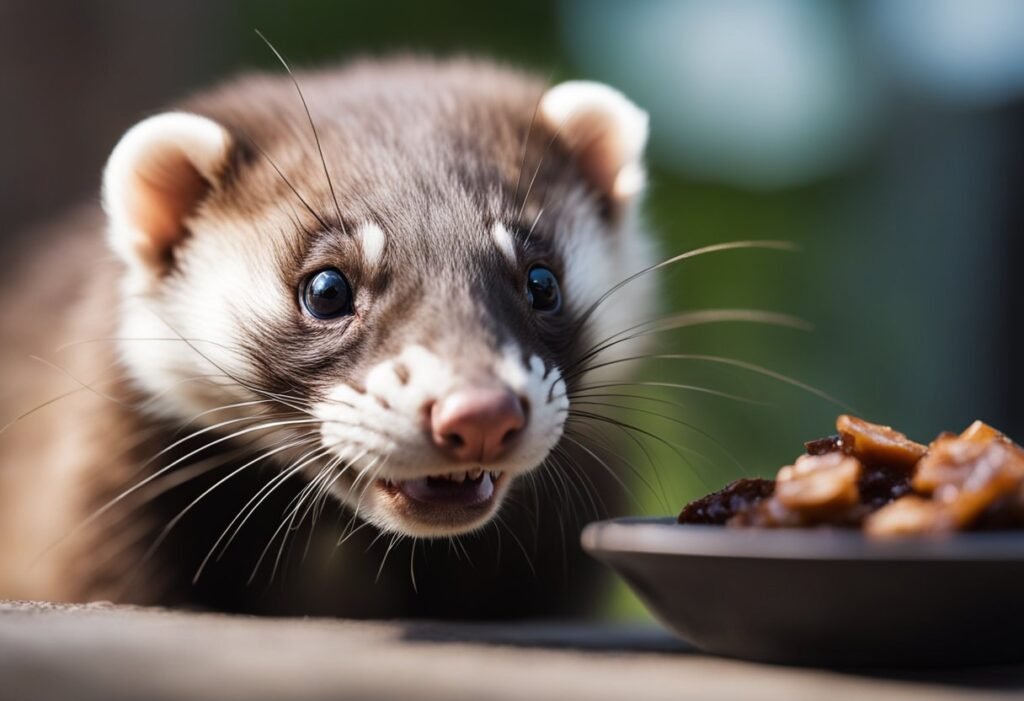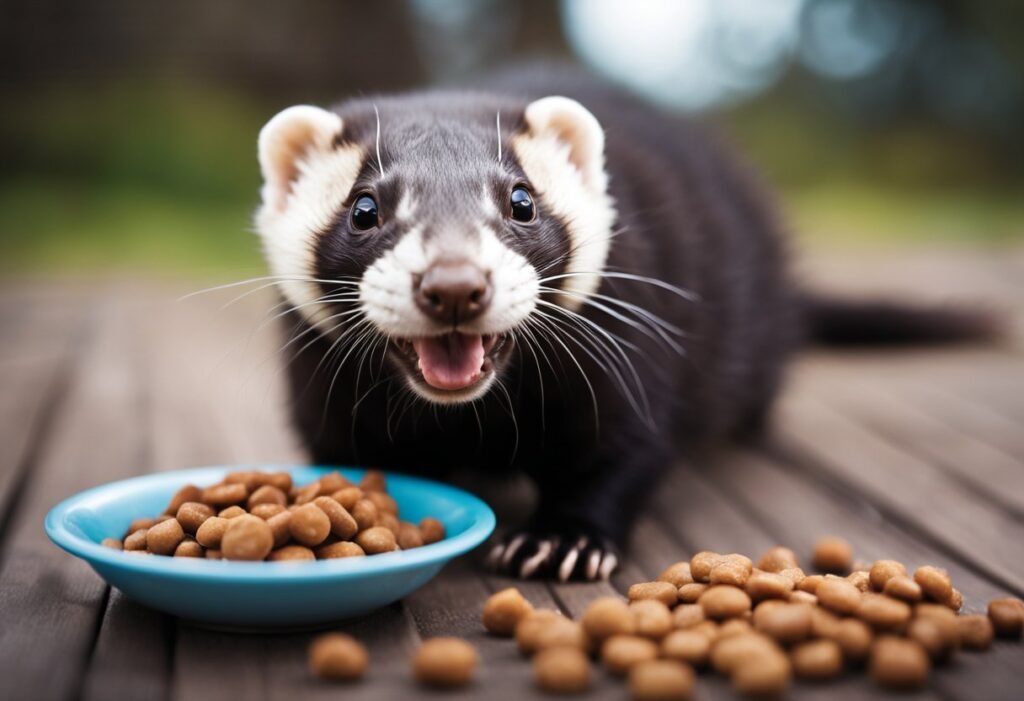Ferrets are adorable and playful creatures that make great pets. As a responsible pet owner, it’s important to ensure that your ferret is receiving a balanced and nutritious diet. However, it can be confusing to know what foods are safe and appropriate for your ferret to eat. One common question that many ferret owners have is whether or not their furry friend can eat beef jerky.

Beef jerky is a popular snack among humans, but it’s important to remember that ferrets have different dietary needs. While ferrets are obligate carnivores and require a diet that is high in protein, it’s important that their protein comes from animal sources that are easily digestible. Beef jerky, on the other hand, is often high in salt and preservatives and can be difficult for ferrets to digest. In addition, many beef jerky products contain seasonings and flavorings that can be harmful to ferrets.
Can Ferrets Eat Beef Jerky?

Ferrets are obligate carnivores, which means they require a diet that consists of meat and animal-based proteins. While beef jerky is a meat-based snack that is popular among humans, it may not be suitable for ferrets.
Beef jerky is high in protein, but it also contains a significant amount of salt and preservatives, which can be harmful to ferrets. Ferrets have a small digestive system, and consuming too much salt or preservatives can lead to digestive issues such as diarrhea or vomiting.
Additionally, beef jerky is often flavored with seasonings and spices that may not be safe for ferrets. Some of these seasonings can irritate a ferret’s digestive system or even be toxic to them.
In conclusion, while beef jerky may seem like a tasty treat for your ferret, it is best to avoid feeding it to them. Instead, stick to a diet that consists of high-quality ferret food and occasional treats that are specifically formulated for ferrets.
Nutritional Needs of Ferrets

Protein Requirements for Ferrets
Ferrets are obligate carnivores, which means they require a diet that is high in animal protein. In fact, protein should make up at least 32% of a ferret’s diet. This is because their bodies are designed to digest and absorb nutrients from animal-based sources more efficiently than plant-based sources.
Some good sources of protein for ferrets include raw or cooked meat, such as chicken, turkey, beef, and lamb. Ferrets can also eat some organs, such as liver and heart, which are rich in protein and other essential nutrients. However, it is important to note that ferrets should not be fed processed meats, such as sausages or hot dogs, as these can contain harmful additives and preservatives.
Fat and Carbohydrate Needs
Ferrets also require a diet that is high in fat and low in carbohydrates. In the wild, ferrets would consume small prey animals, which are high in fat and low in carbohydrates. A ferret’s diet should consist of at least 15% fat, which helps provide them with the energy they need to stay active and healthy.
Carbohydrates, on the other hand, should make up no more than 3-5% of a ferret’s diet. This is because ferrets are unable to digest plant-based carbohydrates, such as grains or vegetables, and these can cause digestive problems and other health issues.
In summary, a ferret’s diet should consist of high-quality animal protein, moderate amounts of fat, and very low amounts of carbohydrates. By providing a balanced and nutritious diet, ferret owners can help ensure their pets stay healthy and happy.
Beef Jerky as a Snack for Ferrets
Ferrets are obligate carnivores, which means they require a diet rich in animal protein. While commercial ferret food is the best option, many pet owners wonder if it is safe to feed their ferrets beef jerky as a snack.
Ingredients in Beef Jerky
Beef jerky is made from lean cuts of beef that are marinated in a mixture of spices, salt, and sugar. Some commercial beef jerky brands may also contain preservatives and artificial flavors. While beef is a good source of protein for ferrets, the other ingredients in beef jerky may not be suitable for their diet.
Salt and sugar, for example, are not recommended for ferrets as they can cause health problems such as dehydration and obesity. Moreover, some preservatives and artificial flavors may cause digestive issues or allergic reactions in ferrets. Therefore, it is best to avoid feeding beef jerky to ferrets, especially those with underlying health conditions.
Health Concerns with Beef Jerky
Apart from the ingredients, beef jerky may also pose a choking hazard to ferrets. The tough texture of beef jerky can get stuck in their throat or digestive tract, leading to serious health complications. Additionally, beef jerky may contain harmful bacteria such as Salmonella or E. coli, which can cause food poisoning in ferrets.
In summary, while beef jerky may seem like a tasty treat for ferrets, it is not recommended as a snack due to the potential health risks. Instead, pet owners should stick to a balanced diet of commercial ferret food and occasional treats such as cooked chicken or raw meat.
Safe Feeding Practices
Portion Control for Ferrets
When it comes to feeding beef jerky to ferrets, it is important to exercise portion control. Ferrets have a small digestive system and can only handle small amounts of food at a time. Overfeeding can lead to digestive issues, obesity, and other health problems. A good rule of thumb is to give ferrets a small piece of beef jerky as a treat, no more than once a week.
It is also important to note that beef jerky should not be a substitute for a well-balanced ferret diet. Ferrets require a diet high in protein and fat, and low in carbohydrates. A good ferret diet should consist of high-quality ferret food, raw or cooked meat, and occasional treats like beef jerky.
Frequency of Treats
In addition to portion control, it is important to limit the frequency of beef jerky treats for ferrets. While it may be tempting to spoil your furry friend with treats, too many treats can lead to health problems. Overfeeding can cause digestive issues, obesity, and other health problems. It is recommended to give ferrets beef jerky as a treat no more than once a week, and to limit the amount to a small piece.
Overall, feeding beef jerky to ferrets can be a safe and enjoyable treat when done in moderation. By exercising portion control and limiting the frequency of treats, ferret owners can ensure their furry friends stay healthy and happy.
Alternatives to Beef Jerky
Healthy Treat Options for Ferrets
While beef jerky may seem like a tasty treat for ferrets, it is not the healthiest option. Fortunately, there are plenty of other snack options that are both tasty and nutritious for your furry friend.
One option is freeze-dried meat treats, which can be found in pet stores or online. These treats are made from 100% meat and contain no additives or preservatives. They are a great source of protein and are easy to digest for ferrets.
Another healthy treat option for ferrets is raw meat. Raw chicken, turkey, and lamb can be cut into small pieces and given to your ferret as a treat. Make sure to handle the raw meat properly to avoid any risk of bacterial contamination.
Homemade Ferret Treats
If you want to give your ferret a special treat, consider making homemade treats. This way, you know exactly what ingredients are going into your ferret’s snack.
One easy homemade treat is a chicken broth popsicle. Simply boil chicken bones and water to make a broth, then pour the broth into an ice cube tray and freeze. Your ferret will love licking the chicken broth popsicle on a hot day.
Another homemade treat option is a meatball made from ground turkey or chicken. Mix the ground meat with egg and breadcrumbs, then form into small meatballs and bake in the oven. Your ferret will love the taste of these homemade treats.
By choosing healthy and homemade treat options, you can ensure that your ferret is getting the best nutrition possible while still enjoying a tasty snack.
Understanding Ferret Digestion
Ferret Digestive Tract
Ferrets have a short digestive tract, which means that they are unable to digest certain foods that humans can easily digest. Unlike humans, ferrets have a simple stomach and no cecum, which is the part of the digestive system that helps in the breakdown of plant matter. The absence of a cecum in ferrets means that they are not able to digest fiber-rich foods such as fruits and vegetables.
The ferret digestive system consists of the mouth, esophagus, stomach, small intestine, and large intestine. The small intestine is responsible for the absorption of nutrients, while the large intestine is responsible for the absorption of water.
Impact of Human Foods on Ferrets
Ferrets are obligate carnivores, which means that their diet should consist mainly of meat. While ferrets can eat some human foods, it is important to note that not all human foods are safe for them. Some human foods can cause digestive problems, while others can be toxic to ferrets.
One such food is beef jerky. While beef jerky is high in protein, it is also high in salt and preservatives, which can be harmful to ferrets. Ferrets have a low tolerance for salt, and excessive salt consumption can lead to dehydration and other health problems.
In conclusion, ferrets have a unique digestive system that is different from humans. While they can eat some human foods, it is important to ensure that their diet consists mainly of meat and that they are not given foods that can cause digestive problems or be toxic to them.
Frequently Asked Questions
What are the dietary risks of giving beef jerky to ferrets?
While beef jerky is a tasty snack for humans, it may not be the best choice for ferrets. This is because beef jerky is often high in salt and preservatives, which can be harmful to ferrets if consumed in large quantities. In addition, some brands of beef jerky may contain spices or other ingredients that could upset a ferret’s digestive system.
Can ferrets safely consume cooked meats such as beef?
Yes, ferrets can safely consume cooked meats such as beef. In fact, meat is an important part of a ferret’s diet as they are obligate carnivores. However, it is important to ensure that the meat is cooked thoroughly and does not contain any spices or other ingredients that could be harmful to ferrets.
What should I avoid feeding my ferret to ensure its health?
To ensure your ferret’s health, it is important to avoid feeding them foods that are high in sugar, fat, or carbohydrates. This includes foods such as fruits, vegetables, grains, and dairy products. In addition, it is important to avoid feeding your ferret any foods that are toxic to them, such as chocolate, caffeine, and onions.
In an emergency, what human foods can ferrets eat?
In an emergency, ferrets can eat cooked meats such as chicken or turkey, as well as cooked eggs. However, it is important to ensure that the food is plain and does not contain any spices or other ingredients that could be harmful to ferrets.
How does dry food affect a ferret’s diet?
Dry food can be a convenient and practical option for providing your ferret with a balanced diet. However, it is important to choose a high-quality dry food that is specifically formulated for ferrets. In addition, it is important to ensure that your ferret has access to fresh water at all times, as dry food can be dehydrating.
Are there any specific meat-based treats that are beneficial for ferrets?
Yes, there are several meat-based treats that can be beneficial for ferrets, such as freeze-dried meat treats or small pieces of cooked chicken or turkey. However, it is important to ensure that the treats are low in salt and do not contain any harmful ingredients.





